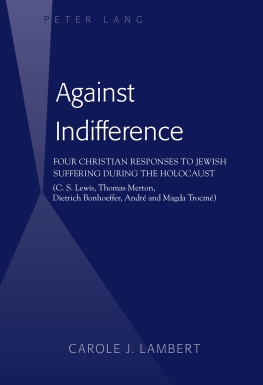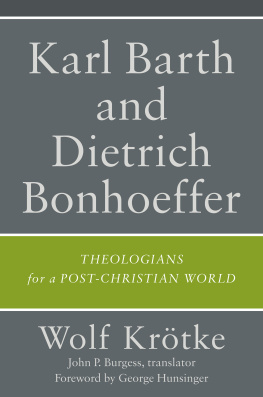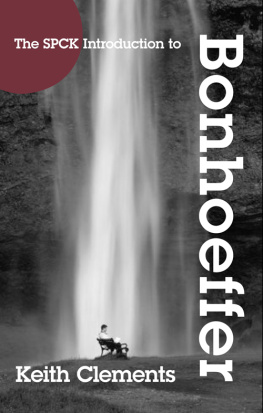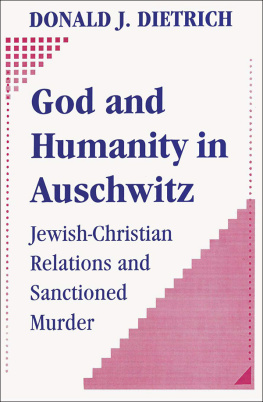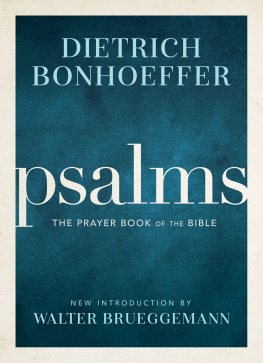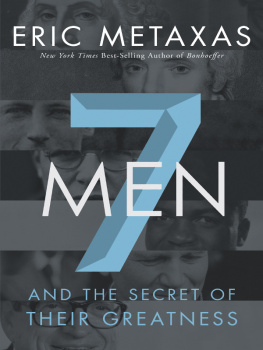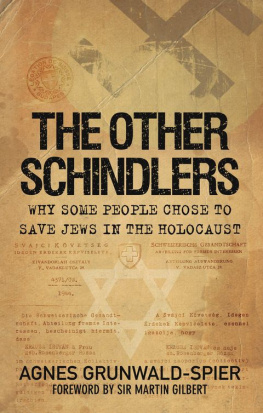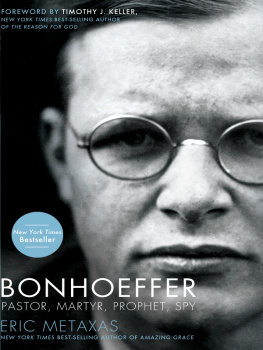
PETER LANG
New York Bern Frankfurt Berlin
Brussels Vienna Oxford Warsaw
CAROLE J. LAMBERT
Against Indifference
FOUR CHRISTIAN RESPONSES TO JEWISH SUFFERING DURING THE HOLOCAUST
(C. S. Lewis, Thomas Merton, Dietrich Bonhoeffer, Andr and Magda Trocm)

PETER LANG
New York Bern Frankfurt Berlin
Brussels Vienna Oxford Warsaw
Library of Congress Cataloging-in-Publication Data
Lambert, Carole J., author.
Against indifference: four Christian responses to Jewish suffering
during the Holocaust (C.S. Lewis, Thomas Merton, Dietrich Bonhoeffer, Andr and Magda Trocm) / Carole J. Lambert.
pages cm
Includes bibliographical references and index.
1. JudaismRelationsChristianity. 2. Christianity and other religionsJudaism.
3. Holocaust, Jewish (19391945)Religious aspectsChristianity.
4. Christianity and antisemitismHistory20th century.
5. Holocaust (Christian theology).
BM535.L257 231.765dc23 2015003546
ISBN 978-1-4331-2767-0 (hardcover)
ISBN 978-1-4539-1569-1 (e-book)
Bibliographic information published by Die Deutsche Nationalbibliothek.
Die Deutsche Nationalbibliothek lists this publication in the Deutsche Nationalbibliografie; detailed bibliographic data are available on the Internet at http://dnb.d-nb.de/.
2015 Peter Lang Publishing, Inc., New York
29 Broadway, 18th floor, New York, NY 10006
www.peterlang.com
All rights reserved.
Reprint or reproduction, even partially, in all forms such as microfilm, xerography, microfiche, microcard, and offset strictly prohibited.
For my most beloved husband of forty-eight years and favorite research assistant:
David Eugene Lambert
TABLE OF CONTENTS
I am grateful to Dr. Heidi Burns, who died in May 2014, for sharing my vision for this book and encouraging me to complete it by offering me the contract for it and by supporting me in the editing of my three previous books for Peter Lang Publishing, Inc. Her successor, Ms. Michelle Salyga, has kindly continued this encouragement and deep understanding of my topic of indifference, for which I am most appreciative. Ms. Jackie Pavlovic has graciously and efficiently served me again as my Production Editor, and I am greatly indebted to her as well.
Dr. David Esselstrom, Chair of the Department of English at Azusa Pacific University, enabled me to research intensely during Fall 2014 by offering me three credits of research time. Without that assistance this text would not have been completed by its contractual date. Hence I owe him much for this support and our friendship since 1986 when I began teaching at A.P.U.
Many university colleagues have also promoted this project by permitting me to speak about C. S. Lewis, Thomas Merton, and Dietrich Bonhoeffer on campus at philosophy forums and Common Days of Learning. I am particularly indebted to my philosopher friend, Dr. Teri Merrick, who reads ix | x Bonhoeffer with me in German and who guided me through a major reorganization of the chapter about him that appears in this book. It definitely needed her reasoning power, offered with her usual gentle kindness and good humor.
Students, also, have contributed to this book, particularly my brilliant, well organized, and competent research assistants, first Chad Seiler and then Andrew Soria after Chads graduation. All of the students of my Freshman Writing Seminars of the past two years have read pages of this text and shared their thoughts about indifference and Holocaust studies in general. I am profoundly grateful to Chad, Andrew, and my wonderful, thoughtful students.
Finally, I have been loved and supported in countless ways by my husband, David Eugene Lambert, a historian and dynamic teacher, to whom this book is dedicated. x | 1
I believe with all my heart that whoever listens to a witness becomes a witness. Once we have heard, we must not stand idly by. Indifference to evil makes evil stronger Elie Wiesel (quoted in Sahagun AA4).
Atrocities occurred during the Shoah, but too many Christians were indifferent to them. In retrospect, from the point of view of twenty-first century Jews and Christians alike, this can seem incomprehensible. Why did C. S. Lewis and Thomas Merton, well known Christians who lived in that era, not react resoundingly to the brutal genocide of Jews about which Polish underground agent Jan Karski informed Great Britain and the United States as early as November 1942 (Karski 384, 38788)? On the contrary, why did brilliant German Protestant pastor Dietrich Bonhoeffer become involved in a plot to assassinate Adolf Hitler, the evil force behind the Jewish genocide? And, why did Protestant pastor Andr Trocm and his wife Magda risk their lives both hiding Jews and helping them to escape from their provincial town in southern France on to freedom beyond its Nazi occupied borders? What can persons concerned about ethics and ethical behavior today learn from these responses to Jewish suffering which range from minimal action to maximal intervention? This book intends to answer these questions. 1 | 2
One simple definition of indifference follows: a dulled, insensitive, and uncaring disposition toward people (Johnson and Ridley 124). W. Brad Johnson and Charles R. Ridley note that [c]ompassion stands in opposition to indifference (124). Although Johnson and Ridley are writing for an audience of business professionals, their simple definition works well for both personal and professional life since the dulled, insensitive, and uncaring disposition is present at the deepest psychic levels in human beings and hence can manifest itself in all aspects of their lives. The dynamics of altruism overcoming this disposition are worthy of study. The compassion of the Trocms is clear, but can this word be used to describe Bonhoeffers actions? Definitely not indifferent to Jewish suffering, and certainly most concerned about the destruction of the German Church by Hitlers attempts to invade and control it through his henchmen, Bonhoeffer must have struggled with whether or not intense compassion for some required the murder of others, even others as evil as Hitler. Bonhoeffers response is the polar opposite to those of Lewis and Merton who did little to help Jews in distress. The chapters that follow explore the spectrum of reactions to the Shoah from indifference (Lewis) to silence (Merton) to violence (Bonhoeffer) to a dynamic pacifism (Trocms) in an order of increasing activity in opposition to genocidal Nazi forces and social structures.
I have chosen to analyze the responses of these five people because they are all basically good persons, four males and one female, from diverse nations (the Irish Lewis, the French/American Merton, the German Bonhoeffer, and the French Andr Trocm and his Italian/French wife Magda), who lived through World War II and knew more or less about the Shoah, and who professed a deep commitment to Jesus Christ and His teachings about love, a love that definitely did not encourage indifference to the sufferings of others. There are many other fine people that I could have added to this study, but I wanted to focus on both the famous (Lewis, Merton, and Bonhoeffer) and the less known (the Trocms). I trusted that important lessons about indifferenceand the fight against itcould be learned from these committed Christians. As Thomas Merton noted in his bestselling autobiography of 1948, The Seven Story Mountain, Human nature has a way of making very specious arguments to suit its own cowardice and lack of generosity (363).
Next page
